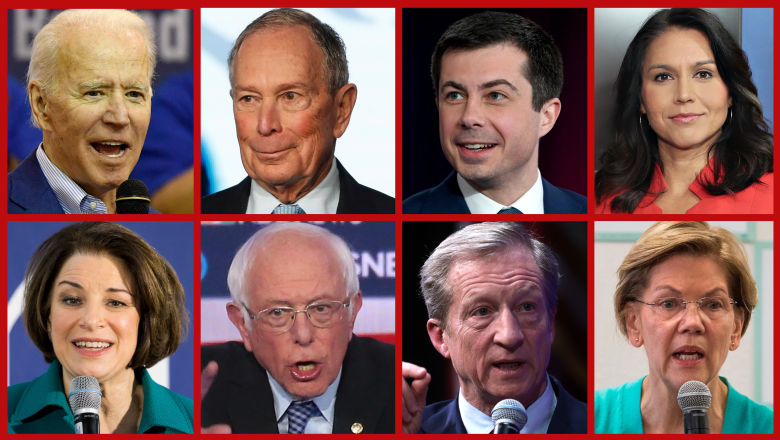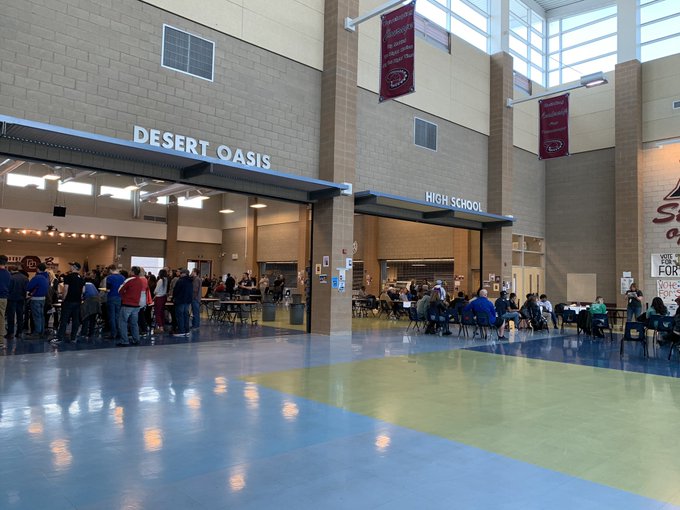
Getty Nevada Caucus
The Nevada Democratic Caucus might be a long affair today, depending on if it encounters any problems similar to what the Iowa caucus had. However, this doesn’t mean it’s going to be a long day for voters. Voters will arrive at their precinct caucuses, vote twice, and then they are free to leave. Instead of having “polls” all day long like during a primary, the Nevada caucus takes place at a specific time and voters must be there for the entirety of the caucus event. Here’s a look at the time it starts and ends and how long it lasts today on Saturday, February 22, 2020.
By 5:30 p.m. Eastern, Fox News had projected Bernie Sanders as the winner of the Nevada Caucus. Two hours later, by 7:30 p.m. Eastern, NBC News was also projecting Bernie Sanders to win.
Decision Desk called the race for Bernie Sanders around 7:30 p.m. Eastern.
(Note: Heavy has partnered with Decision Desk to bring live results from the first vote, second vote, and the delegate count in Nevada, along with updates throughout the day. You can see them in Heavy’s story here.)
Doors Open at 10 AM & Registration Closes at 12 PM Pacific
Unlike primaries, where you can vote all day during a specific time period, caucuses are different. In Nevada, you have to show up at a specific time and stay for the duration of the caucus. It’s more like a party meeting than your traditional polling vote.
The Nevada caucus doors will open for registration at 10 a.m. Pacific (which is 12 p.m. Central, 1 p.m. Eastern, or 11 a.m. Mountain) on February 22. The caucus itself doesn’t actually begin until 12 p.m. Pacific, according to the Nevada Democratic Party (NDP.) So, registration runs from 10 a.m. to 12 p.m. Pacific.
The Los Angeles Times noted that the caucuses will likely be called to order at 12:30 p.m. Pacific (2:30 p.m. Central/3:30 p.m. Eastern/1:30 p.m. Mountain.)
There were some questions about the closing time. One site lead stuck fast to the 12 p.m. Pacific cutoff and turned some people away, including a Sanders supporter who thought the caucus worked like a primary when you could vote at any time. But Michelle Rindels, of the Nevada Independent, said the Bernie supporter had actually voted early.
To find your precinct’s caucus polling location, visit caucus.nvdems.com.
Fox Called Its Projection Around 5:30 PM Eastern & Decision Desk Called the Race for Bernie Sanders at 7:30 PM
Much like Iowa, Nevada has only two alignment votes in each precinct’s caucus. And much like Iowa, it could take some time before we actually learn the results.
The results might be known in some precincts as early as an hour after caucuses are called to order, which would be around 4:30 p.m. Eastern/3:30 p.m. Central/2:30 p.m. Mountain/1:30 p.m. Pacific. But depending on how things go, it could take a lot longer than that to get results. In the end, the calls were made between 5:30 p.m. and 7:30 p.m. Eastern.
NBC News estimated that we wouldn’t even hear partial results any earlier than 4 p.m. Eastern/3 p.m. Central/2 p.m. Mountain/1 p.m. Pacific. Some caucuses had already reported full numbers on their final alignments by 4:30 p.m., but getting those translated into official county delegate estimates took more time.
There was at least one caucus that started late, so its results won’t arrive for a while. Check-in started an hour late because they didn’t have early voting data, so the Desert Oasis High School Caucus results may be among the last.
At 5:30 p.m. Eastern, with 4 percent of precincts reporting, Fox already called the race for Bernie Sanders.
And then President Donald Trump weighed in with his thoughts.
New York Intelligencer noted that by 6:47 p.m. Eastern, few results were released yet. But the Nevada Democratic Party said caucuses are going well and we should have results soon.
By 7:30 p.m. Eastern, NBC News was projecting Bernie Sanders to win the Nevada Caucus too.
Decision Desk also called the race for Sanders by around 7:30 p.m., as did ABC News.
Heavy has partnered with Decision Desk to bring live results from the first vote, second vote, and the delegate count. You can see them in Heavy’s story here.
Caucus Rules
According to The Green Papers, anyone who will be at least 18 on November 3 is eligible to vote on February 22. They must be a registered Democrat to vote, but registration or party changes can happen on caucus day.
Delegates will be awarded proportionally. Just like in Iowa, non-viable supporters can realign to another candidate after the first round of voting. Viability is determined by the precinct’s size. If a precinct has four or more delegates, then viability starts at 15 percent. It’s 16.6 percent for three delegates, 25 percent for two delegates, and 50 percent for precincts with just one delegate.
The video below explains a little about how caucus votes translate to delegates.
This isn’t the last step before the Democratic National Convention, however. County conventions are on April 18 and the Nevada State Democratic Convention is on May 30.
In order to win the first ballot at the Democratic National Convention, a candidate needs a total of 1,991 pledged delegates.
Nevada has a total of 48 delegates, with 23 being allocated according to the caucus vote percentages. Then 13 delegates are allocated based on the State Convention delegates’ support, including eight at-large national convention delegates and five pledged PLEOs. So in total, there are 36 delegates at stake in today’s caucus.
Twelve additional Nevada National Convention delegates are unpledged PLEOs (superdelegates) which include five DNC members, five Congress members (two Senators and three Representatives), the governor, and a distinguished party leader (this time, former Senate Majority Leader Harry Mason Reid), the Green Papers explained.
These PLEO delegates were previously known in 2016 as superdelegates. Unlike in 2016, they will only be able to vote at the Democratic National Convention if a candidate does not get a majority of votes on the first ballot at the DNC.
READ NEXT: Bloomberg’s Betting Odds Drop Sharply During Democratic Debate
